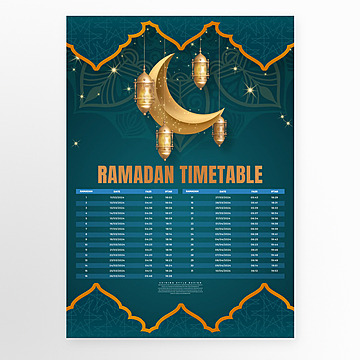
Ramadan is a sacred month for Muslims worldwide, observed through fasting, prayer, and reflection. A well-structured Ramadan Timetable is essential to maintaining a disciplined routine during this holy period. This timetable helps Muslims organize their daily activities, ensuring they observe fasting (Sawm), prayers (Salah), and other religious duties effectively.
Importance of a Ramadan Timetable
A Ramadan Timetable serves as a guide to help Muslims manage their daily religious obligations while maintaining balance in their personal and professional lives. The primary aspects covered in a Ramadan schedule include:
- Sehri (Suhoor) Timing – The pre-dawn meal before fasting begins.
- Fajr Prayer – The first prayer of the day performed before dawn.
- Iftar Timing – The time to break the fast at sunset.
- Maghrib Prayer – The evening prayer offered right after breaking the fast.
- Taraweeh Prayers – Special night prayers performed in the congregation during Ramadan.
- Other Obligations – Recitation of the Quran, voluntary prayers (Nafl), and charitable acts.
A well-planned Ramadan Timetable ensures that fasting individuals remain mindful of prayer timings and engage in spiritual activities effectively.
Sehri and Iftar Timings
The Sehri (pre-dawn meal) and Iftar (fast-breaking meal) timings vary based on geographical location. Since Ramadan follows the lunar Islamic calendar, the exact timings of Sehri and Iftar shift daily. Many Islamic centers and online platforms provide accurate Ramadan Timetables specific to different regions, allowing Muslims to prepare accordingly.
Tips for Sehri:
- Eat a balanced meal with proteins, healthy fats, and complex carbohydrates.
- Drink plenty of water to stay hydrated throughout the day.
- Avoid excessive salty or spicy foods to minimize thirst.
Tips for Iftar:
- Break your fast with dates and water, following the Sunnah of Prophet Muhammad (PBUH).
- Include nutritious foods like fruits, vegetables, and lean proteins.
- Avoid overeating to prevent discomfort and sluggishness during night prayers.
Prayer Schedule During Ramadan
Prayer is an integral part of a Muslim’s daily routine, and Ramadan emphasizes increased devotion. A Ramadan Timetable includes the five daily prayers along with Taraweeh. Below is a general structure:
- Fajr (Pre-dawn prayer) – Performed before sunrise, marking the beginning of the fast.
- Dhuhr (Noon prayer) – Midday prayer, usually during work or school hours.
- Asr (Afternoon prayer) – Late afternoon prayer before sunset.
- Maghrib (Sunset prayer) – Offered immediately after breaking the fast.
- Isha (Night prayer) – Performed after dinner, followed by Taraweeh.
- Taraweeh (Additional night prayers) – A special prayer exclusive to Ramadan, where Muslims recite portions of the Quran.
Following a structured Ramadan Timetable ensures that individuals do not miss any prayers while maintaining their spiritual growth.
Adjusting Work and Personal Life
Balancing work, school, and personal life during Ramadan can be challenging. However, an effective Ramadan Timetable can help individuals remain productive while fulfilling religious obligations.
Key Strategies:
- Plan Ahead – Adjust your daily schedule to accommodate prayer and fasting requirements.
- Rest Adequately – Ensure sufficient sleep by scheduling naps if necessary.
- Manage Energy Levels – Eat nutrient-rich meals to sustain energy throughout the day.
- Limit Extracurricular Activities – Prioritize worship and family time over non-essential engagements.
Employers and educational institutions in many Muslim-majority and non-Muslim countries recognize the significance of Ramadan and may offer flexible working hours to accommodate fasting employees and students.
Finding an Accurate Ramadan Timetable
With the advancement of technology, accessing a Ramadan Timetable has become easier. Several resources provide accurate schedules, including:
- Local Mosques – Most mosques distribute printed and online timetables for the community.
- Islamic Websites – Platforms like IslamicFinder, Muslim Pro, and local Islamic centers offer updated prayer and fasting schedules.
- Mobile Applications – Apps such as Muslim Pro and Athan provide customized Ramadan Timetables based on location.
Conclusion
A well-prepared Ramadan Timetable is essential for maintaining discipline, ensuring timely prayers, and balancing daily life during this holy month. It helps Muslims stay spiritually connected while efficiently managing their commitments. By following a structured schedule, individuals can enhance their devotion, strengthen their faith, and make the most of the blessings of Ramadan.